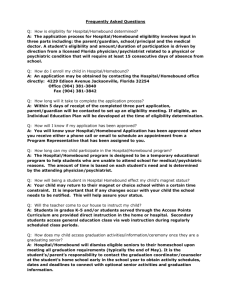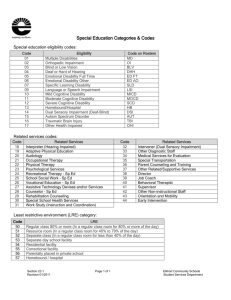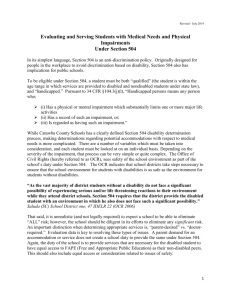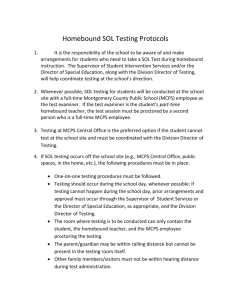Section 504 - Midland Independent School District
advertisement
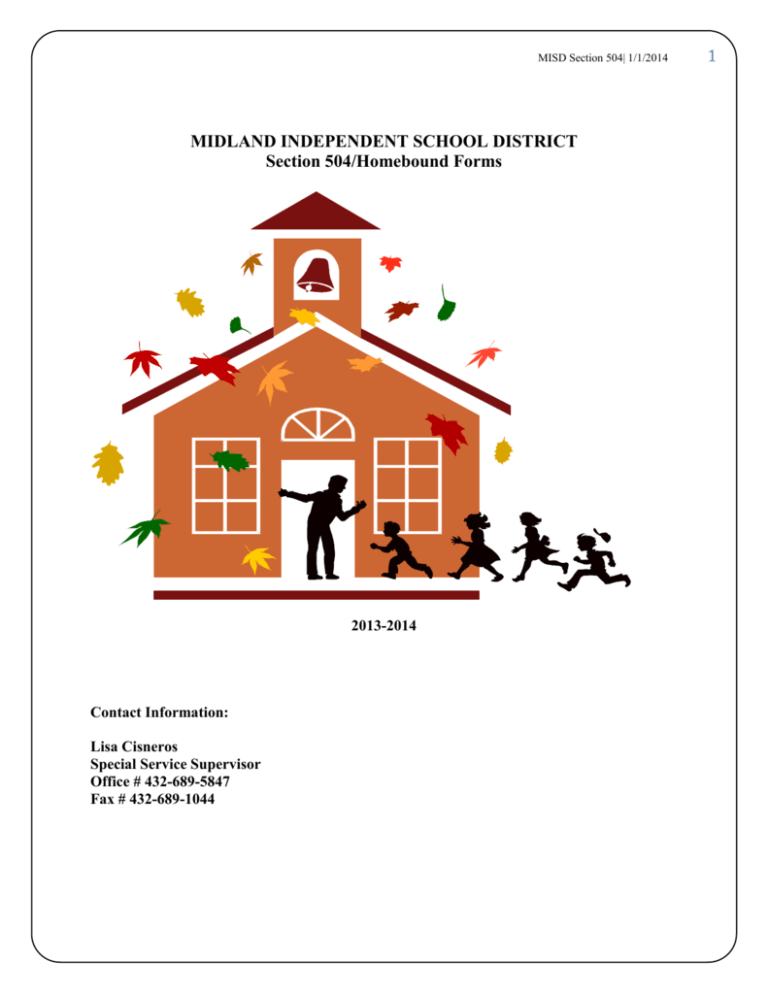
MISD Section 504| 1/1/2014 MIDLAND INDEPENDENT SCHOOL DISTRICT Section 504/Homebound Forms 2013-2014 Contact Information: Lisa Cisneros Special Service Supervisor Office # 432-689-5847 Fax # 432-689-1044 1 MISD Section 504| 1/1/2014 Section 504 Overview of Frequently Asks Questions What is Section 504? Section 504 is a part of the Rehabilitation Act of 1973 that prohibits discrimination based upon disability. Section 504 is an anti-discrimination, civil rights statute that requires the needs of students with disabilities to be met as adequately as the needs of the non-disabled are met. Section 504 states that: “No otherwise qualified individual with a disability in the United States, as defined in section 706(8) of this title, shall, solely by reason of her or his disability, be excluded from the participation in, be denied the benefits of, or be subjected to discrimination under any program or activity receiving Federal financial assistance...” [29 U.S.C. §794(a), 34 C.F.R. §104.4(a)]. Who is covered under Section 504? To be covered under Section 504, a student must be “qualified ” (which roughly equates to being between 3 and 22 years of age, depending on the program, as well as state and federal law, and must have a disability) [34 C.F.R. §104.3(k)(2)]. Who is an “individual with a disability”? As defined by federal law: “An individual with a disability means any person who: (i) has a mental or physical impairment that substantially limits one or more major life activity; (ii) has a record of such an impairment; or (iii) is regarded as having such an impairment” [34 C.F.R. §104.3(j)(1)]. What is “impairment” as used under the Section 504 definition? Impairment as used in Section 504 may include any disability, long-term illness, or various disorders that “substantially” reduces or lessens a student’s ability to access learning in the educational setting because of learning-, behavior- or health-related condition. [“It should be emphasized that a physical or mental impairment does not constitute a disability for purposes of Section 504 unless its severity is such that it results in a substantial limitation of one or more major life activities” (Appendix A to Part 104, #3)]. Many students have conditions or disorders that are not readily apparent to others. They may include conditions such as specific learning disabilities, diabetes, epilepsy and allergies. Hidden disabilities such as low vision, poor hearing, heart disease or chronic illness may not be obvious, but if they substantially limit that child’s ability to receive an appropriate education as defined by Section 504, they may be considered to have an “impairment” under Section 504 standards. As a 2 MISD Section 504| 1/1/2014 result, these students, regardless of their intelligence, will be unable to fully demonstrate their ability or attain educational benefits equal to that of non-disabled students (The Civil Rights of Students with Hidden Disabilities under Section 504 of the Rehabilitation Act of 1973— Pamphlet). The definition does not set forth a list of specific diseases, conditions or disorders that constitute impairments because of the difficulty of ensuring the comprehensiveness of any such list. While the definition of a disabled person also includes specific limitations on what persons are classified as disabled under the regulations, it also specifies that only physical and mental impairments are included, thus “environmental, cultural and economic disadvantage are not in themselves covered” (Appendix A to Part 104, #3). What are "major life activities"? Major life activities include, but are not limited to: self-care, manual tasks, walking, seeing, speaking, sitting, thinking, learning, breathing, concentrating, interacting with others and working. As of January 1, 2009 with the reauthorization of the Americans with Disabilities Amendment Act, this list has been expanded to also include the life activities of reading, concentrating, standing, lifting, bending, etc. This may include individuals with AD/HD, dyslexia, cancer, diabetes, severe allergies, chronic asthma, Tourette’s syndrome, digestive disorders, cardiovascular disorders, depression, conduct disorder, oppositional defiant disorder, HIV/AIDS, behavior disorders and temporary disabilities (e.g., broken writing arm, broken leg, etc.). Conditions that are episodic or in remission are also now covered if they create a substantial limitation in one or more major life activity while they are active. Students who are currently using illegal drugs or alcohol are not covered or eligible under Section 504. What does “substantially limits” mean? Substantially limits are not defined in the federal regulations. However, in a letter from the Office for Civil Rights (OCR), they state, “this is a determination to be made by each local school district and depends on the nature and severity of the person’s disabling condition.” New guidance from the Americans with Disabilities Amendment Act states that Section 504 standards must conform to the ADAAA and is “intended to afford a broad scope of protection to eligible persons.” In considering substantial limitations, students must be measured against their same age, non-disabled peers in the general population and without benefit of medication or other mitigating measures such as learned behavioral or adaptive neurological modifications, assistive technology or accommodations. Who can refer a child for consideration for evaluation under Section 504? Anyone can refer a child for evaluation under Section 504. However, while anyone can make a referral, such as parents or a doctor, OCR has stated in a staff memorandum that “the school district must also have reason to believe that the child is in need of services under Section 504 due to a disability” (OCR Memorandum, April 29, 1993). Therefore, a school district does not 3 MISD Section 504| 1/1/2014 have to refer or evaluate a child under Section 504 solely upon parental demand. The key to a referral is whether the school district staff suspects that the child is suffering from a mental or physical impairment that substantially limits a major life activity and is in need of either regular education with supplementary services or special education and related services. If a parent requests a referral for evaluation, and the school district refuses, the school district must provide the parent with notice of their procedural rights under Section 504. Who decides whether a student is qualified and eligible for services under Section 504? According to the federal regulations: “...placement decisions are to be made by a group of persons who are knowledgeable about the child, the meaning of the evaluation data, placement options, least restrictive environment requirements, and comparable facilities” [34 C.F.R. §104.35(c)(3)]. Unlike Special Education, the federal regulations for Section 504 do not require or even mention that parents are to be a part of the decision-making committee. The decision to include parents in the decision-making committee is a determination that is made by each school district and should be spelled out in the district’s procedures for implementing Section 504. Parents should at least be asked and encouraged to contribute any information that they may have (e.g., doctor’s reports, outside testing reports, etc.) that would be helpful to the Section 504 committee in making their determination of what the child may need. Schools are expected to make sound educational decisions as to what the child needs in order to receive an appropriate education. What information is used in doing an evaluation under Section 504? Under Section 504, no formalized testing is required. The 504 Committee should look at grades over the past several years, teacher’s reports, information from parents or other agencies, state assessment scores or other school administered tests, observations, discipline reports, attendance records, health records and adaptive behavior information. Schools must consider a variety of sources. A single source of information (such as a doctor’s report) cannot be the only information considered. Schools must be able to assure that all information submitted is documented and considered. ***The following pages will assist campus 504 Coordinators to prepare for meetings and complete all required paperwork*** 4 MISD Section 504| 1/1/2014 MISD PRE-Print Check list 1. Print prior to meeting Screen 9-Committee Signature Screen 4-Referral (only if needed) Screen 4-Referral check box for Parent & Teacher Input (Updated every year) Screen 5- Evaluation (only if needed) Screen 6- Meeting Notice In Reports- Procedural Safeguards & Receipt of (ESPED) In Reports-504 plan w/o Procedural Rights- Members sign sheet will print (ESPED) ` Meeting Checklist (MISD website under “Special Forms”) Receipt for Accommodations (MISD website under “Special Forms”) Student Data Sheet (MISD website under “Special Forms”) 504 Meeting Agenda (MISD website under “Special Forms”) 2. Complete 504 Notice in ESPED Prior to meeting check box by red statement- include the following- Send ALL original signature pages to Central Office. 3. Notify and remind campus staff about 504 meeting. 4. Upload & Print from Schoolnet- information on STAAR, STATS, or benchmarks 5 MISD Section 504| 1/1/2014 Section 504 Student Data Sheet ***This form is to be completed and submitted to Lisa Cisneros following all 504 meetingsSend to Central office #506*** Campus ID# 1. 2. 3. 4. 5. Student Name: Student ID# DOB Grade Meeting Date General Homebound Service Dates (if apply) To Date of Initial Eligibility (mm/dd/yyyy) Date of Eligibility (Dated yearly from annual meeting) (mm/dd/yyyy) ***Check appropriate reason for meeting*** Entry Accommodations Required: Annual Behavioral BIP Review Medical Manifestation Academic Receiving RTI Amendment Exit Area of Disability ***Check appropriate area*** ADHD Dyslexia Health Physical Other Printed name of person completing form 6 MISD Section 504| 1/1/2014 504 Meeting Agenda Student: Campus: Date: 1. 2. 3. 4. 5. 6. 7. 8. 9. Introductions Sign Attendance Sheet below- PRINT State Purpose of meeting Present Notice of Procedural Rights Parents signs notice of rights receipt Screen 1-Review Student information- Choose 504 status Screen 2-Review Contact Information-Legal Guardianship Discuss eligibility 504 Plan Screen 7 a. Answer questions 1-3 and add description to each b. 1 STATE DISABILITY, 2 describe, 3 describe action plan c. Committee Minutes will be in the “Deliberations” tab-This must be filled out 10. Screen 8- Mark Placement 11. Screen 9- Committee Signatures 12. Screen 10- Mark Eligibility code 13. Screen 11-Dyslexia 14. Screen 12-Homebound 15. Copy and file any documents received by parents or other significant parties. Attendance (Print names below) 6. 7. 8. 9. 10. 11. 12. 7 MISD Section 504| 1/1/2014 504 Records 2013-2014 Receipt for Accommodations is a student receiving 504 services. A copy of the 504 Plan including accommodations can be found on SchoolNet by the following steps below: 1. Locate student on SchoolNet 2. Click on “Learning Plan and Teacher’s Notes” 3. Scroll to the bottom of the page under “Student Work/Other Evaluations 4. Click download to see the SchoolNet Bundle from eSped I acknowledge that I am responsible for following these steps to access my copies of the student’s documents from the most current 504 meeting in order to comply with the Federal and State Laws concerning 504 services. Print Name Signature Date 8 MISD Section 504| 1/1/2014 ESPED Reminders Esped Remember Process, Procedures, and Compliance o Suspect a disability TAKE ACTION, begin the 504 processes or referral to Spec. Ed. o Send meeting Notice o Procedural Safe Guards are to be sent or given to parents at the beginning of every meeting. Available in Spanish or English. o Prepare for your meeting- collect ALL data that gives the committee a clear idea of the student’s needs. o GO to MISD website, sign in and click on “Special Services Forms”, these forms are important pieces to your meeting and have paperwork that is required by district. o Annual Reviews are required- make sure prior files are archived. Look at Archive Manager. Important Screens o Screens 1 & 2-Students and contact information- Review and change any information that is not correct. o Screen 4-Referral- Fill out this page. Every year students are reviewed for eligibility. This also acts as a cover sheet for the 504 Plan. o Screen 5-Evaluation- ONLY filled out for Dyslexia assessment request. Remember, when requesting Dyslexia evaluation, the 504 process begins. We are ONLY using this screen for Dyslexia. If you feel that the student needs a different evaluation please contact the specialist in that area and follow district procedures. o Screen 7- Everything about the student will be found on this page. DO NOT overlook these areas: Referred by Date of meeting Question 1- State the disability 9 MISD Section 504| 1/1/2014 Question 2 Question 3- If answer is NO explain why ALL answers need to be marked YES for eligibility. STAAR Accommodations Screen 14 will need to be checked (screen7) and filled out according to state and district guidelines. (Refer to TEA testing guidelines to ensure appropriate 504 accommodations). Dyslexia-Screen 11 will need to be checked (screen 7) and filled out for every student. Homebound-Screen 13 will need to be checked (screen 7) when the services are being discussed or put in place. Refer to homebound packet on MISD website. Screen 7- Deliberations- the State requires the committee to provide a summary of services and discussions. This WILL be filled out. Screens 8-10- Marks the eligibility; according to 504 committee. DO NOT forget signatures Campus Files o Print off the 504 plan from Esped in the reports section. o All documents reviewed in meeting provided by parent or other significant parties. o Send all original signature pages plus a copy of the 504 plan to Central office to Lisa Cisneros. o Keep 504 plan in a yellow file folder in PRC District Files o 504 plan o Original signature o All documentation provided by parent or other significant parties. 504 Campus Coordinator role o Set-up meetings o Esped-data input and follow district and state guidelines. 10 MISD Section 504| 1/1/2014 o 504 plan distribution to parent and teachers on campus. o Must understand and know eligibility requirements. 11 MISD Section 504| 1/1/2014 ***The following information will assist campus 504 Coordinators with Homebound Referrals and meetings*** 12 MISD Section 504| 1/1/2014 General/Special Education Homebound Procedures Any student who is served through the general/Special ed. educational homebound program must meet all three of the following criteria below: Yes to all 3?’s 1. Is the student expected to be confined at home or hospital bedside for a minimum of four weeks. The weeks do not have to be consecutive? 2. Is the student confined at home/hospital bedside for medical reasons only? 3. Is the student’s medical condition documented by a physician licensed to practice in the United States? Note: Nurses or other staff cannot sign on medical documents. If “YES” to all three above, then the student is eligible for GEH/Sped. Referral: First steps: 1. Contact Lisa Cisneros at Central office in Special Services Department. Student will be entered in ESPED by campus. If served under Special Education, please specify. 2. Parent must complete the “Consent for Release of Information” and send completed form to Lisa Cisneros. (Obtain form from MISD Special services website). 3. Doctor will be contacted by Lisa Cisneros to verify eligibility and “Doctors Verification” will be sent by Lisa Cisneros to the doctor. 4. A 504 meeting or ARD will be scheduled after all above are completed. GEH/504 Committee A designated campus committee must make decisions regarding general education homebound (GEH) placement and services. Members can include, but not be limited to: 1. Campus administrator 2. General education teacher currently teaching student. 3. A parent/guardian of the student. Role of the Committee The role of the GEH/504 committee is to review and consider eligibility and deem necessary provision of instruction to a general education student at home/hospital bedside. If instruction is provided at home/hospital bedside the committee will determine the type(s) of service and amount of instruction to be provided. (See GEH funding) 13 MISD Section 504| 1/1/2014 Making Committee/ARD Decisions 1. Committee must consider information from the student’s physicians. However, the physician’s note/information is not the sole determining factor in the committee’s decision making process. 2. Students receiving GEH at home/hospital bedside must be served by a certified general education teacher in all courses including electives. GEH Funding Per the TEA Attendance Accounting Handbook students receive credit for attendance based on the following: (Four hours per week of daily instruction makes the student eligible for full day membership. 19 TAC § 129.21 (i)) Amount of time served per week: Eligible days present earned per week: One hour One day present Two hours Two days present Three hours Three days present Four or more hours Four days present (4 day week) Five days present (5 day week) ******Eligible days present are determined each week. Hours may not be accumulated and do not carry to the next week nor may be applied to the previous week. Transition from General Education Homebound to General Education Campus 1. Students who are on General Ed. Homebound can have a transition period from GEH to the school based general education classroom. 2. The transition period is set up by the GEH/504 committee to return the student to the school-based setting. 3. The GEH committee should reconvene to review current student information (including the physician’s statement) to determine if a transition period is necessary and the date homebound services are no longer appropriate. 4. If the student requires a transition period when returning to the classroom, the GEH committee should document the following: a) The length of time for the transition period. 14 MISD Section 504| 1/1/2014 b) The amount of time the student will be served in both settings (homebound and classroom) during the transition period. c) The effective date the student returns to the classroom fulltime must be documented. 5. If the student will not be able medically to return to school then attendance at school would not be appropriate and the GEH would continue the student on GEH services based on current medical information. Students with a Recurring Chronic or Acute Health Condition 1. A student with a chronic illness or acute health problem that is a recurring condition that requires the student to be in the GEH program for a period of time (which can be in daily or weekly increments) totaling at least 4 weeks throughout the school year based on the following: a) Students served with a recurring condition will move back and forth between the GEH program and a school based placement. Funds will be generated subject to the Homebound Funding Chart: For any week in which the student with the recurring condition ↓↓↓↓↓↓↓ The student earns contact hours and/or attendance ↓↓↓↓↓↓↓ Is served solely at home/hospital bedside through the GEH program, →→→→ According to requirements of the Homebound funding Chart Is served at least 4 hours at home/hospital bedside through GEH program and attends school at his or her campus→→→→ According to requirements of the Homebound funding Chart Is served from 1 to 3 hours at home/hospital bedside through the GEH program and attends school at his or her campus→→→→→ According to requirements of the Homebound funding Chart for those days the student is provided instruction at the home/hospital bedside through the GEH program and according to the 2-through-4hour rule for those days the student attends school at his or her campus, as long as the student is present during the official attendance-taking period. After the General Education Homebound Committee Meeting 1. Complete the 504/GEH documents in Esped program 2. Send all original documents to Lisa Cisneros (via pony). 3. Fax a copy of the students a) Class Schedule/Teacher(s) name b) Demographic information 15 MISD Section 504| 1/1/2014 To: Lisa Cisneros@ Central office lisa.cisneros@midlandisd.net 4. A General Education Homebound teacher will be assigned. Campus teacher responsibilities- Communication is the key to making students homebound services successful. 1. Provide email and contact information. 2. Assignments will be prepared and delivered to the office every Friday, unless homebound teachers has requested earlier. 3. Progress reports will be included with assignments during progress reporting time. 4. IF a student fails an assignment, the campus teacher must send the homebound teacher an email and discuss a plan to re-teach the lesson. 5. Benchmarks, District, and State assessments need to be scheduled and planned cooperatively with the homebound teachers. All assessments can be given by Homebound Teacher. 6. Assignments will be graded in an appropriate amount of time after receiving completed assignments. Homebound teacher responsibilities 1. Provide email and contact information. 2. Access all student information from Esped, Grade speed, and Schoolnet. 3. Students are to receive a minimum on 4 hours weekly. 4. The teacher will arrange an appropriate time to meet with student. 5. Changes will be made to schedules as new students are added to the program. Homebound teachers will communicate all changes with parent. 6. Assignments will be picked up every Friday, unless otherwise directed. 7. Grades are given in combination with campus teacher and homebound teacher. 8. Teacher will teach all core subject areas. Additional subject areas will be taught at the homebound teacher’s discretion. 9. Excessive absences with homebound services may warrant failing grades. Absences due to existing medical complications or doctor appointments will be made up if the teacher’s schedule allows during the instructional week. Parents’ Responsibilities 1. An adult other than the teacher is required to be present during all class sessions. 2. Provide an area in the home that is appropriate for learning. Ex. Quiet, good lighting, comfortable for both teacher and student. 16 MISD Section 504| 1/1/2014 3. Notify teacher prior to lesson when session is to be postponed, cancelled or rescheduled. 4. When medical conditions change this will be communicated with the homebound teacher. 5. Excessive absences with homebound services may warrant failing grades. Absences due to existing medical complications or doctor appointments will be made up if the teacher’s schedule allows during the instructional week. 17
